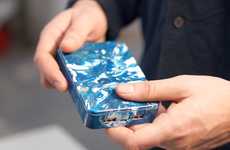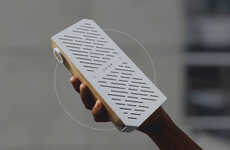
Gomi Used Non-Recyclable Waste for Its Latest Product Range
References: gomi.design & dezeen
Common materials like plastic bags, bubble wrap, among other things are deemed as non-recyclable waste by the relevant UK council. Brighton-based design studio Gomi chooses to challenge this notion with its latest range of stylish portable speakers.
The chic collection is not only incredibly aesthetically pleasing, but it also makes use of the aforementioned materials. That is, the speakers are an amalgamation of non-recyclable waste. More specifically, each of Gomi's Bluetooth-enabled products equates to about 100 plastic bags of waste that was deemed non-reusable.
In addition, Gomi's portable speakers also have an incredibly chic exterior. Rectangular in shape, the products feature a unique marble print that has been done by hand. Ultimately, the project "intercepts a waste stream that would otherwise be landfilled or incinerate."
The chic collection is not only incredibly aesthetically pleasing, but it also makes use of the aforementioned materials. That is, the speakers are an amalgamation of non-recyclable waste. More specifically, each of Gomi's Bluetooth-enabled products equates to about 100 plastic bags of waste that was deemed non-reusable.
In addition, Gomi's portable speakers also have an incredibly chic exterior. Rectangular in shape, the products feature a unique marble print that has been done by hand. Ultimately, the project "intercepts a waste stream that would otherwise be landfilled or incinerate."
Trend Themes
1. Upcycling Non-recyclable Waste - Design studios are upcycling non-recyclable waste to create aesthetically pleasing products, disrupting traditional waste management practices.
2. Sustainable Product Design - The use of non-recyclable waste as a material in product design is driving sustainable innovation in the product manufacturing industry.
3. Handcrafted Aesthetics - Designers are incorporating unique, handcrafted aesthetics in products to appeal to conscious consumers, opening doors for artisanal and localized manufacturing opportunities.
Industry Implications
1. Consumer Electronics - The consumer electronics industry has opportunities to redefine their production processes and incorporate sustainable materials in product design to appeal to conscious consumers.
2. Manufacturing - Manufacturing industries have an opportunity to incorporate sustainable materials in their production processes to reduce waste and environmental impact while creating unique products.
3. Design - The design industry has opportunities to integrate sustainable and handcrafted aesthetics in product manufacturing, creating unique products and disrupting traditions in waste management.
3.5
Score
Popularity
Activity
Freshness























